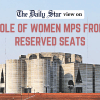Are women’s reserved seats in parliament only tokens?

As per Article 65(3) of our Constitution, 50 women took oath as Members of Parliament (MPs) for the seats reserved for women, some of whom have also become ministers. Reserved seats are intended to politically empower women. But does our present reservation system really promote the empowerment of women politicians?
Meaningful participation in political activities and decision-making is an essential prerequisite for gender equality and for a genuine democracy based on adult franchise. Bangladesh's parliament features 300 MPs who are elected from single territorial constituencies by direct election. An additional 50 seats are reserved for women who are elected by the 300 directly elected MPs. Such representation unfortunately is not consistent with the much-coveted goal of politically empowering women.
For the reservation system to be effective, the representation of women needs to be both adequate and meaningful. In the 12th Parliament, women's representation from election to the 50 reserved seats amounts to 14.3 percent. If we add this to the representation by 20 women who were elected from open seats, women's total representation in parliament increases to 20 percent. This is grossly inadequate and unfair given that women make up half of our population. If we are to achieve true gender equality, to which we are committed as a nation and have done better in many areas compared to many other countries, women's rightful representation in the national parliament must be no less than 50 percent.
In order to be meaningful, the existing seat reservation system must meet several important conditions. First, the system must not reflect tokenism; that is, the generosity of the political bosses. Second, the reservation system must adhere to the democratic principle of direct election based on adult franchise. Third, members elected to the reserved seats must be accountable to the people rather than to the party high-ups. Fourth, women on reserved seats must not have overlapping representation. Fifth, women MPs from reserved seats must have equal rights, responsibilities, and authority as those of their female counterparts elected to the open seats. Sixth, competence and electability must be the basis of nominating women politicians to the reserve seats. Seventh, nomination of members to the reserved seats must not be a tool for patronage distribution by party bosses.
Unfortunately, the current system of reserved seats does not meet any of these conditions in order to ensure the meaningful representation of women in our parliament. For one, 50 seats out of 350 is not an equitable representation of women and clearly reflects tokenism, as if it were a kind of favour being bestowed on women politicians by the party supremos. Members for the reserved seats are also selected by the 300 MPs who have been elected to regular seats, rather than by the people themselves of specific constituencies. It may be noted that in its election manifesto, titled Dinbodoler Sanad(Charter for Change), published prior to the 2008 election, Awami League made the commitment to reserve 100 seats for women to be filled via direct election, which it failed to keep.
In a democratic polity, elected officials are accountable to the voters who elect them and who can also vote them out of office. But in the reservation system, party higher-ups nominate women for the 50 seats and the rest of the elected MPs merely rubber-stamp those nominations. Ultimately, the politicians from the reserved seats are, for all practical purposes, answerable to those bosses. In fact, the voting public have nothing to do with either the election or their continuation as MPs on the reserved seats.
Although reserved seat politicians are not elected from specific constituencies, they are artificially assigned to represent several constituencies which have elected MPs of their own, thus creating an overlap of representation. As MPs from reserved seats are not directly elected, they are considered "extras" or ornamental, and have no responsibility as such to the constituencies to which they are assigned. The nomination to a reserved seat is viewed as a patronage tool, and connection to party bosses rather than competence or popularity is the determining factor behind such nominations. The most recent election to reserved seats served as a consolation prize for some of the women who were defeated on January 7. It is thus clear that the present system of seat reservation for women in the parliament does not help to create a cadre of dedicated women leaders for the future.
An alternative to this regressive mechanism could be a rotational system, presently employed in India's local government elections. Under the rotational system, with a third of the seats mandated as reserved for women, in the first term one-third of the seats will be reserved for women, for which women politicians will compete against each other to be elected by the people. For the rest of the two-third open seats, both men and women will compete against each other. In the second term, the previously reserved seats will become open, and half of the previous open seats will be reserved for women. In the third term, the remaining open seats will be reserved for women. Thus, over three terms, at least one female MP will be elected from each constituency, creating a pool of 300 women leaders who will be elected directly, competing against other women and based on their competence and popularity. Under such a rotational system, some of the competent women who win reserved seats, based on their competence, will be able to get elected competing against men when their seats become open. As a result, representation of women in parliament will be more effective than via the mandated one-third reservation. It should also be noted that a meaningful system of reservation for women can be crafted in a proportional system of representation.
Dr Badiul Alam Majumdar is secretary at SHUJAN: Citizens for Good Governance.
Views expressed in this article are the author's own and do not reflect those of any organisation, institution or entity with which he is associated.
Follow The Daily Star Opinion on Facebook for the latest opinions, commentaries and analyses by experts and professionals. To contribute your article or letter to The Daily Star Opinion, see our guidelines for submission.

 For all latest news, follow The Daily Star's Google News channel.
For all latest news, follow The Daily Star's Google News channel. 








Comments